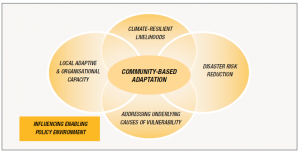Communities and Climate Change
In the following set of chapters, students studied community-based adaptation and mitigation strategies in response to a changing climate (see Figure below). In particular, they researched a specific community to begin to get a sense for its overall social, economic, technological, and environmental conditions. Furthermore, they mapped the community’s assets and vulnerabilities in relation to the community’s climate challenges, opportunities, and resilience. Broad areas of background they could investigate for each community included: population density, education levels, major industries, economic health, overall climate, political structures, and technological access and capabilities and how these factors relate to climate change in that location.
Students explore climate change for residents and ecosystems in Puerto Rico in Chapter 9, with an emphasis on shifting agricultural and industrial practices. In Chapter 10, students seek to understand the current threats to Boston, Massachusetts, especially given historical decisions to create land from the sea. Next, Chapter 11 focuses on the consequences of changes in rainfall and temperature to agricultural properties in the Himalayan Mountains. The island nation of Fiji, is facing a multitude of threats (e.g., sea level rise, changes in precipitation) from climate change, and students explore these topics in Chapter 12.

